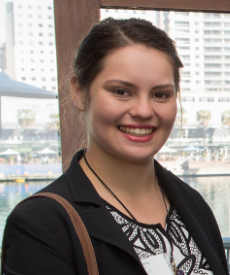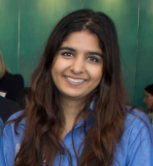CSW report back: Youth Forum Day 1
On Saturday, the young women representing NCOSS at the 61st Commission on the Status of Women attended Day 1 of the second ever CSW Youth Forum - along with 750 other activists and advocates from around the world.
The Youth Forum is an opporutnity for young people to contribrute to the work areas of the Commission on the Status of Women. This includes interactive sessions and collaborative discussions on a number of areas to develop recommendations to the UN Commission on the Status of Women. The outcomes will be presented by Youth representatives to UN bodies, governments and civil society.
Here are the first reflections of our representatives!
 Keira Jenkins
Keira Jenkins
Why do people have to lose their identity to be economically empowered? That was the question asked at the CSW61 youth forum Indigenous women’s empowerment breakout session. To me, that question was absolutely groundbreaking, and while I cant speak for the other women in the room I felt an air of agreement amongst us all. Many of the women, including myself no longer live in our traditional lands, mostly we were following education and opportunities. Many of us had lost language and traditions and some like myself felt the disconnect that comes with growing up away from the lands of your ancestors. But why is it that we must either fall behind socially and economically or leave our culture behind? That , we agreed, was not fair and opportunities for women in Indigenous communities need to be more prevalent. That discussion and meeting the wonderful Indigenous women from around the world was definitely the highlight of day one of the youth forum. Very inspiring.
 Lauran Stanley
Lauran Stanley
I feel as though for a Youth Forum, today I listened to a lot of people over 25. As a young person, I am far too used to being talked at, and being told by older people about my own experiences. About how we as Youth are largely voiceless, and how innovators in many different spaces are so kind as to give us hapless Youth a platform, upon which we may vocalise our tiny voices.
I have an issue with the word voiceless - nobody is voiceless, however many people are unheard, and their opinions not given credence. The Youth, and in particular, young women are not voiceless, we are unheard. Young women are doing a lot of amazing things in this world at present - and while it was interesting to hear from older people, this is a youth conference, and I want to hear young women talking about themselves and their lives, rather than older people talking about their contribution to the plight of the youth.
I attended the breakout session which pertained to addressing violence against women. It was facilitated largely by delegates from the World Association of Girl Guides and Girl Scouts. During such, WAGGGS delegates from Uganda and Argentina ran an activity together, in a fabulous display of how conferences such as these encourage the collaboration of people across continents. Within this session we were encouraged to collaborate and agree on two issues which would be combined into the collaborations of other breakout groups and eventually presented to be negotiated into the CSW gender equity document. An interesting part of this process was that each group within our breakout session was largely on the same page in terms of the big issues, despite hailing from all proverbial corners of the globe. Gender/sex education and law reform - every group suggested the former, and many the latter, and the diverse views and experiences really added to the suggestions of wording and foci; showing how working together across I intersections covers so many more aspects of an issue than a homogenous group could.
 Harpreet Dhillon
Harpreet Dhillon
On the first day of the United Nations Youth Forum, I attended the Refugee and Migration thematic session. There, thanks to my sponsorship from Settlement Services International, I brought the topic of discrimination to the panel discussion and encouraged the outcomes of the discussion to be included in recommendations for CSW61.
There were also discussions around mental health and how refugees don’t have a voice. Those who were part of the panel talked about their experiences as an activist / volunteer for human rights initiatives in countries of conflict. But issues of discrimination that occur when refugees migrate to another country weren’t being addressed. As an advocate for both Culturally and Linguistically Diverse (CALD) people and Youth, I have had opportunities to meet and work with young refugees from both Syria and Iran - learning about their stories in their home country but also their experiences in Australia. I was disheartened not only to hear the trauma they face but also how people didn't treat them as humans. I heard how people in Australia were telling them to go back to where they came from, especially when wearing a hijab.
This isn't right, these people, like us, have a journey and a story.
For us to be bystanders, we make it worse, as it makes refugees feel they are alone and that they aren't allowed into our 'multicultural Australia'. Yet as a 17-year-old Australian born girl but with brown Indian skin I care very much for their wellbeing as well as about empowering them to have the best future possible.
If we show them that we care, not so much through charity but by listening to them, we can create a bond / friendship with them, we can empower them to make a difference as well as assisting them to aid others and creating both an intergenerational and butterfly effect. This can use their stories to empower others. We need to stop telling ourselves they don't have a voice, they do have a voice, it's just that many of us don't listen. These people are not a statistic, each and every one of them is a human being. At the end of the day we are all part of one race and that is the human race. Thank you for taking the time to read.
With thanks to the sponsors that made their trip possible:

